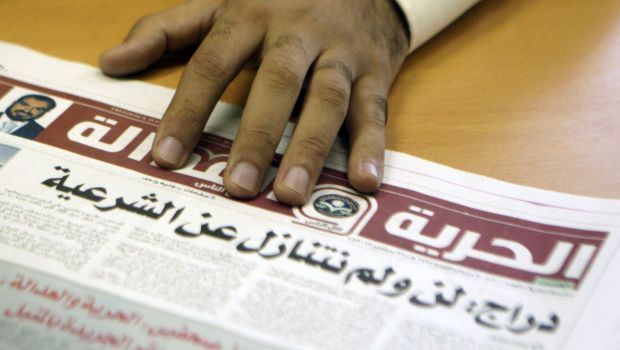
File photo of the Egyptian Muslim Brotherhood’s Freedom and Justice Newspaper. (REUTERS/Amr Abdallah Dalsh)
The source suggested that the conference may be opened by a senior Turkish official. He added that differences had arisen between the Egyptian Brotherhood on the one side and Islamist and other Arab Brotherhood groups on the other, over the main points of discussion at the conference hours before heading for Turkey.
An Islamist source, speaking to Asharq Al-Awsat by telephone from the United Arab Emirates on the condition of anonymity, said the points of discussion of the conference were initially about the future of political Islam following the Arab Spring revolutions, especially in Egypt, Tunisia and Libya. However, he said some figures belonging to the “International Muslim Brotherhood Organization,” which is controlled by the Egyptians, “changed the agenda of the conference, directing it against Cairo and the new authorities in Egypt.”
“We were surprised that they changed the points of discussion to direct [the conference] at attacking the Egyptian army and Egyptian authorities,” the source in the UAE continued.
He added that some Egyptian Brotherhood figures offered to fund the conference and had provided the funds.
An Islamist from Kuwait told Asharq Al-Awsat that “the idea of the conference was suggested to the Muslim Brotherhood in Kuwait by the Muslim Intellectual Forum. The title of the forum [we were given] was comprehensive, not limited to Egypt, but also dealing with the international stance on legitimacy and good governance in Arab Spring states.”
Meanwhile, a prominent figure who supported the conference in its new form—an Egyptian Brotherhood figure who is banned from leaving Egypt because he is under criminal investigation—defended the conference. He said its aim was to clarify the Arab stance and study the Egyptian model and “the results of the January 25 revolution in Egypt, which did not achieve its goals due to the coup against deposed president Mohamed Mursi. After his rule, Egypt faced a counter-revolution by the military, which is rejected by Egyptians.” He added that the Brotherhood did not stand against the army itself, but against its leadership.
The conference will discuss “the results of the coup in Egypt and its dangerous repercussions for the Arab and Islamic worlds, in addition to how to strengthen the fledgling democracies against all efforts to force their failure.”
Organizers of the conference said it enjoyed the participation of “parties and international organizations including the International Union of Muslim Scholars, the Islamic Coordinating Council and other organizations, in addition to a number of researchers and intellectuals.”
